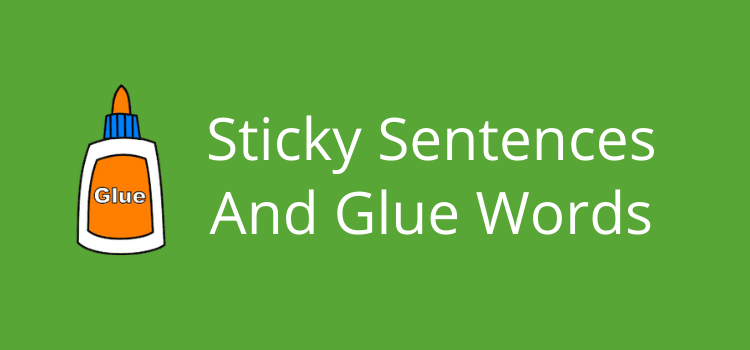
What are sticky sentences and glue words in writing?
They are sentences that use too many unnecessary words, especially transition words and conjunctions. When this happens, it can dilute your writing, making it difficult to read and understand and weakening the overall impact.
While transition words and conjunctions are essential for connecting ideas and creating a smooth flow in your writing, too many can overly complicate your sentences.
Sticky sentences can also occur when using weak verbs or adverbs or repeating words or phrases too often.
Defining sticky sentences and glue words
Strong words are always nouns, verbs, adjectives, and adverbs in any sentence.
These words tell your reader about who does or did what.
Jane eats chocolate.
Jane doesn’t eat bananas.
But you can’t write in simple verb phrases all the time.
Your writing would be extremely boring.
That’s why we use words to join or glue phrases and ideas together.
Jane eats chocolate, but she doesn’t eat bananas.
The word but is a glue word, and it indicates a contrast or opposite in the example, and it reads much better than two separate sentences.
However, if you add more glue words than are necessary, as I did in the last sentence, the result is a sticky sentence.
How to measure stickiness
I’ll take the example sentence I used above and add some extra information.
From what I understand, Jane is really into eating lots of chocolate, but she doesn’t eat much fruit like bananas and such like.
The sentence is grammatically correct. But you can see that many of the words say nothing, so it’s now sticky. But how sticky is it?
A good grammar checker can sometimes help you.
I checked this sentence with Prowritingaid, and you can see that 13 of the 24 words, or 54.2% in the sentence, are glue words.

As a general rule of thumb, any result with over 40% glue words is a sticky sentence.
Common glue words
The easiest way to define a filler or glue word is that it says nothing or adds little value.
You can find many lists of filler words, but here are my top twenty that you can often remove from a sentence.
1. in
2. of
3. into
4. by
5. there
6. from
7. what
8. for
9. some
10. much
11. just
12. even
13. very
14. really
15 literally
16. well
17. until
18. then
19. but
20. therefore
It’s not to say that you shouldn’t use these words. You need them all at certain times. But when one sentence contains more than four, five, or six, it’s probably a good sign that you need to do some editing.
Another form of filler words is weak verbs with adverbs. It’s usually better to use a stronger verb.
For example, instead of ran quickly, you could use sprinted or raced.
How to fix sticky sentences

When you find a sentence dripping with glue words, it’s time to rewrite and edit the sentence.
I’ll intentionally write a very sticky sentence and then see if I can fix it.
Just when I sat down to write this, my head was so full of ideas that I seemed literally to get really confused, and then from that point, I struggled to get into the topic in any meaningful way and write with any purpose.
There are 44 words in the sentence above, but 28 are filler words. That’s around 64%, which is way too high.
Now, I’ll try to unstick it.
When I started to write this, my head was full of ideas, but I became confused and struggled to stay on topic.
The sentence is down to 23 words, of which only 5 are glue words or only 21%.
It’s obvious that I removed a lot of fluff from the original sentence.
But it’s worth noting that I also changed the first verb from sat down to started because it is a stronger verb.
Almost every sentence you write will be sticky because you absolutely need linking words.
But it’s the amount of stickiness that can become a problem.
If you find that a sentence is more than 40% sticky, then it’s a genuine sticky sentence.
Where did the term originate?
In the book Plain English For Lawyers by Richard Wydick, he said:
In every English sentence are two kinds of words: working words and glue words.
A well-constructed sentence is like fine cabinetwork. The pieces are cut and shaped to fit together with scarcely any glue. When you find too many glue words in a sentence, take it apart and reshape the pieces to fit together tighter.
Although he didn’t refer to sticky sentences, his reference to glue was enough to coin the phrase.
Remove the excess glue
You might be surprised to discover how many glue words and sticky sentences you use in your writing.
There are many ways to reduce the number of words in a manuscript or text. But glue words are one of the easy fixes.
The obvious time to find them is when you are reading your first draft. Look for extra-long, unclear, or weak sentences.
Some writing checkers can help. But sometimes, as with Grammarly, glue words are highlighted under clarity.
As far as I know, though, Prowritinaid is the only writing tool that has a specific stickiness checker with word counts and percentages.
But whichever way you work, you will always find sentences that are overly sticky.
Then, it’s time for you to get to work.
Related reading: How To Use Inversion In Your Writing
Share This Article



Thank you for posting. Good timing. Just what I needed to read. AI says my writing is sticky.
Thanks again,
Mike
very good advise. I am a good writer with good ideas, but i fade on my persistence, and just stick it on the batch